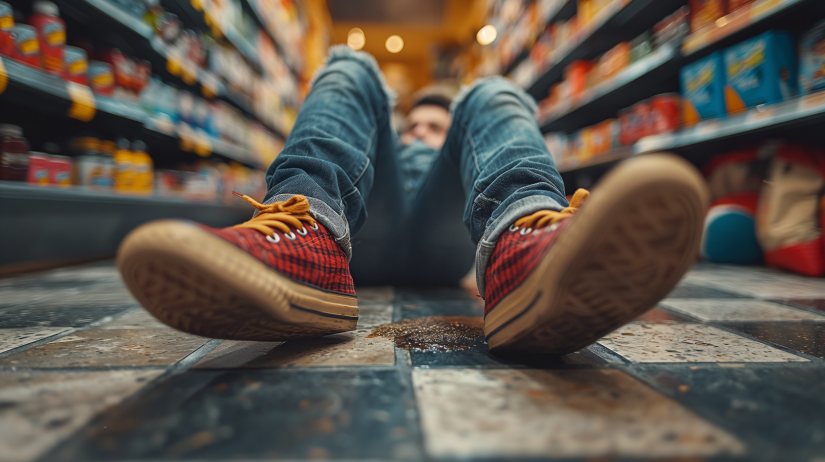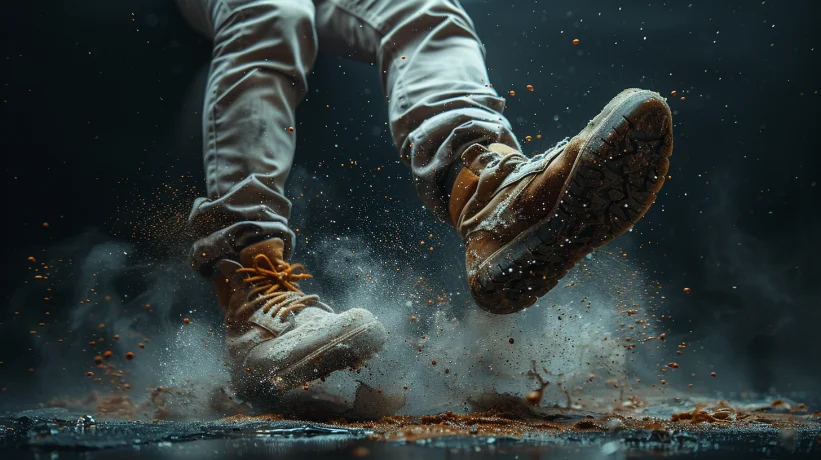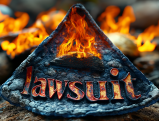
Slip and fall accidents can result in severe injuries and significant disruptions to your daily life. Taking the right steps immediately after such incidents is vital to ensuring your recovery and securing the compensation you deserve.
by LawInc Staff
May 16, 2024
Slip and fall accidents can happen suddenly, causing painful injuries, costly medical bills and lost wages.
Taking the right steps in the immediate aftermath is crucial to protecting your health and legal rights. Preserving evidence, notifying property owners and consulting attorneys can make all the difference in compensation outcomes.
1. Assess Your Injuries and Seek Medical Care
-
- Check for Visible Trauma: Look for bleeding, swelling, bruising or deformities.
- Note Aches and Pains: Back pain, neck stiffness or joint tenderness may indicate sprains or soft tissue damage.
- Call 911 If Needed: Request an ambulance for severe injuries or incapacitation.
- Visit Urgent Care/ER: Get less critical injuries examined and treated promptly.
- Follow Doctor’s Orders: Attend follow-up appointments, take medications and do prescribed therapies.
Examples:
-
- Jim noticed a large cut on his arm that wouldn’t stop bleeding.
- Adam’s ankle was extremely painful and swollen after the fall.
- Emma was unable to stand up or move her leg without excruciating pain.
- Alex went to urgent care for x-rays and a wrist splint fitting.
- Jane attended weekly physical therapy for her back as recommended by the doctor.
How to Proceed:
-
- Conduct a full body scan to identify all potential injuries.
- Don’t try to “tough it out” – some serious issues are not immediately obvious.
- Call emergency services right away if there are broken bones, head trauma or uncontrolled bleeding.
- Visit a medical provider within 24-48 hours even for more minor symptoms.
- Be diligent about the treatment plan to aid healing and document injuries.
FAQs:
-
- What if I feel ok after a fall? Some injuries like concussions or tissue damage may not be apparent right away. Get checked out regardless.
- Does my insurance cover treatment? Health insurance should apply, and the property owner’s liability policy may also come into play later.
- Can I sue for medical bills? You may have a case to recover medical expenses if there was negligence. Consult an attorney.
- What if I can’t afford care? Look into payment plans, legal funding, Medicaid and hospital financial assistance.
- Will gaps in treatment hurt my case? Yes, insurers and juries may doubt injury severity if you skip doctor appointments.
2. Report and Document the Incident
-
- Notify Property Owner/Manager: Make them aware verbally and insist they generate an official accident report.
- Take Photos/Videos: Capture the exact location, your injuries, and any contributing factors like wet floors or uneven pavement.
- Identify Witnesses: Get contact info for anyone who saw you fall in case statements are needed later.
- Preserve Physical Evidence: Save torn or bloodied clothing unwashed, and don’t discard broken personal items from the fall.
- Write a Narrative: Journal what happened in detail while it’s fresh in your memory – the timeline, circumstances, and impacts.
Examples:
-
- Megan told the store manager right away that she had fallen and requested an incident report form.
- Chris took photos showing the puddle he slipped on and how there were no wet floor warning signs.
- Isaac got the names and numbers of other shoppers who saw him trip on the loose rug in the entryway.
- Vanessa kept the ripped pants and broken watch resulting from her tumble down stairs.
- Lauren wrote out a detailed play-by-play of the events while waiting at urgent care.
How to Proceed:
-
- Calmly approach the manager, owner or landlord and clearly state there has been an accident needing a report. Be polite but firm if they seem dismissive.
- Use your phone to photograph the scene from multiple angles. Include any debris, damage or defects that contributed.
- Jot down witness names or ask if they’d be willing to provide a quick recorded statement on your phone.
- Place clothing, shoes and belongings damaged during the fall in a safe bag or box – they help tell the story.
- Include even minor details in your written summary like weather conditions, lighting and noise levels for a complete picture.
FAQs:
-
- What if the owner won’t file a report? Document their refusal and consult an attorney. You may need to file your own report with the property insurance carrier.
- Is it illegal to take photos? Generally not if in a public area and no reasonable expectation of privacy. Don’t trespass or force your way in.
- What if witnesses won’t cooperate? You can’t compel them but having contact info allows your attorney to reach out. Independent third parties are persuasive.
- How long do I need to keep evidence? At least until the statute of limitations has passed, the case settles or a verdict is reached.
- What if my memory is hazy? Record what you do remember ASAP, focusing on big picture facts vs minute details. It’s normal to forget some specifics in a traumatic event.
3. Be Cautious With Insurance Communications
-
- Expect Quick Contact: Property insurers often reach out within days looking for statements. It’s wise to consult an attorney first.
- Stick to the Facts: If you do talk to them, give only basic info on what occurred. Don’t editorialize, guess or admit fault.
- Decline Recorded Statements: Politely refuse if they ask to record the conversation. It can be used against you later.
- Don’t Accept Quick Offers: Initial settlement proposals are often lowballs. Have an attorney review them along with your damages.
- Refer Requests to Counsel: Once you’ve retained a lawyer, tell all insurance reps to direct further communications to your attorney’s office.
Examples:
-
- The store’s insurer called Kyle just two days after his fall looking for a formal statement.
- Linda kept her comments to the bare minimum, resisting urges to speculate or over-explain when speaking to the claims rep.
- Scott asserted his right to decline recording when the adjuster unexpectedly said they were taping the phone call.
- Julia recognized the $500 offer would barely cover one ER visit, let alone ongoing care. She decided to consult an attorney before responding.
- Once he hired representation, Amir informed the property insurer that his lawyer would be handling discussions going forward.
How to Proceed:
-
- Be prepared for an adjuster to call shortly after your accident. You don’t have to give a statement right then – let them know you’re still assessing the situation.
- If you do talk, answer questions honestly but briefly. No need to volunteer extra details or theories.
- It’s your right to refuse recording – simply state you’re not comfortable with that but are willing to continue the call.
- Consult an injury attorney before agreeing to any settlements. They can evaluate if the offer is fair considering your total damages.
- Send a letter or email informing them you now have legal representation and instructing them to contact your lawyer with all inquiries.
FAQs:
-
- Why do insurers want statements? They’re looking foranything that could minimize or deny liability for the accident. Early statements made without counsel can undermine your case.
- What if I’ve already given a statement? Let your attorney know right away. They can assess any potential impact and craft strategies to address it.
- Should I accept some fault to be cooperative? No, there’s no advantage and it could significantly reduce your financial recovery. Let the facts speak for themselves.
- How do I know if an offer is too low? Injury attorneys can calculate your total damages including long-term care needs to determine fair value. Initial offers rarely account for the full scope.
- Will the insurer still work with me if I hire a lawyer? Yes, they’re required to – but your attorney will handle the heavy lifting of dealing with them and advocating for your interests.
4. Discuss Your Case With an Injury Attorney
-
- Act Quickly: Meet with an experienced premises liability lawyer as soon as possible to understand your rights and start building the case.
- Share All Details: Provide your evidence and recount all contributing factors so they can properly assess the scope and challenges involved.
- Disclose Prior Accidents/Injuries: The property owner may try to blame your fall on a pre-existing condition. Being upfront with your attorney prevents surprises.
- Discuss Contingency Fees: Most slip and fall lawyers work for a percentage of the recovery vs hourly charges. Confirm rates before signing.
- Prepare for Process: Your attorney should outline expected steps like investigation, negotiation, filing suit and potential trial so you know what to anticipate.
Examples:
-
- Mark interviewed attorneys while still on crutches, knowing the clock was ticking.
- Laura handed over her incident photos, medical records and clothing to give her lawyer the full picture.
- Paul told his attorney about a prior neck injury, not wanting the store’s lawyers to dig it up first.
- Marie confirmed a 30% contingency rate before moving forward with representation.
- Jim’s lawyer laid out a timeline of next steps, setting expectations for a 6-8 month process at minimum.
How to Proceed:
-
- Look for attorneys who specifically handle slip and fall cases vs general practitioners. Schedule consults ASAP while evidence is fresh.
- Organize your photos, medical records and notes to paint a clear picture. Details matter in premises liability cases.
- Be honest about your health history. Omissions create credibility issues. Your attorney can address valid prior conditions.
- Understand fee structures to avoid surprises. Contingency rates often range from 30-40% without upfront costs.
- Have the attorney walk you through all phases, decision-points and estimated timelines. Patience is key as cases can last months or years.
FAQs:
-
- How do I find the right lawyer? Ask for referrals, read online reviews, and look for ones with specific slip and fall case results. Experience matters.
- What if I can’t afford attorney fees? Contingency fees mean you only pay if you win, and expenses come out of the settlement vs upfront. Most offer free consults too.
- Will my prior injuries automatically sink the case? No, if you had fully recovered or the accident clearly aggravated them, you can still prevail. It depends on specific circumstances.
- What if the owner had no idea of the hazard? They have a legal duty to proactively inspect for and remedy dangers. Ignorance is not a defense if they should have known.
- What is a fair settlement amount? It depends on your specific medical bills, lost wages, pain and suffering, and long-term impacts. A lawyer can assess the full value.
Summary
Slip and fall accidents often lead to serious injuries, costly treatment and missed work. Victims have legal rights to compensation where property owner negligence played a role.
Taking immediate steps like reporting the incident, documenting evidence, and consulting an attorney can significantly improve financial recovery prospects. It’s also crucial to be guarded in insurance communications.
Building a strong premises liability case takes swift, intentional action to preserve key facts and present persuasive claims. Experienced slip and fall lawyers can guide you through the process and fight for maximum compensation.
Conclusion
Knowing your post-slip and fall priorities can make all the difference in protecting your health and legal interests. Getting proper medical care and managing injury risks should be the first order of business.
From there, be diligent about documenting the incident and preserving all relevant evidence. Insurance adjusters will look for any angle to reduce liability exposure. Avoid giving them ammunition through unsavory early statements.
Consulting a knowledgeable premises liability attorney early in the process is also wise. These cases have unique proof burdens that take time to investigate and substantiate.
With proactive, strategic moves you can build a strong foundation for a successful slip and fall claim. Seasoned legal guidance combined with thorough documentation and a bit of patience is the surest path to just compensation.
Were You Injured in a Slip and Fall Accident?
Contact us to be connected with an experienced attorney representing slip and fall accident victims and holding negligent property owners accountable.
Test Your Slip and Fall Knowledge
-
-
- 1. What is the first priority after a slip and fall accident? A) Getting insurance info B) Hiring an attorney C) Assessing and treating injuries D) Notifying the property owner
- 2. When should you seek medical attention after a fall? A) Only if you see blood B) Within a week if in pain C) As soon as possible, even for minor symptoms D) Only if you plan to sue
- 3. Why is it important to formally report a slip and fall? A) It creates a record of the incident B) The owner could fix the hazard and destroy evidence C) It can help identify witnesses D) All of the above
- 4. What types of evidence can support your slip and fall claim? A) Photos/videos of the scene and injuries B) Torn or bloodied clothing worn during fall C) Witness statements and contact info D) All of the above
- 5. What should you avoid saying when reporting a slip and fall? A) Speculating on the cause B) Opining on fault C) Downplaying the extent of injuries D) All of the above
- 6. What is the main reason to consult an attorney after a slip and fall? A) Identify all liable parties B) Meet court filing deadlines C) Properly value your total damages D) All are important reasons
- 7. How soon after a fall should you consult a slip and fall lawyer? A) Within 1 year B) Before giving any insurance statements C) Only if the owner refuses to pay medical bills D) After you’ve healed from injuries
- 8. How do most slip and fall attorneys charge for their services? A) Flat fee per case B) Contingency fee percentage of recovery C) Hourly rate billed monthly D) Retainer deposit plus costs
- 9. What is the property owner’s main legal duty in slip and fall cases? A) Verbally warn of all possible dangers B) Pay for any injuries that occur onsite C) Regularly inspect for and fix hazards D) Have zero slipping risks on the premises
- 10. Can you recover damages if you were partially at fault for your slip and fall? A) Yes, if the owner had greater fault B) No, any shared blame bars recovery C) Only if you had less than 50% fault D) It depends on state comparative negligence laws
- 11. What’s the best way to preserve evidence after a slip and fall? A) Write a detailed incident report B) Take photos/videos of the scene C) Secure witness contact information D) All of the above
- 12. When might a property owner be liable for a slip and fall injury? A) Anytime someone falls on their property B) Only if they created the hazard C) If they knew or should have known of the danger D) Only if they failed to verbally warn of slippery conditions
- 13. What damages can you typically recover in a slip and fall case? A) Medical bills B) Lost wages C) Pain and suffering D) All of the above
- 14. How can pre-existing injuries impact a slip and fall claim? A) They automatically bar any recovery B) The owner can offset damages for unrelated conditions C) You can still recover if the fall aggravated the condition D) There’s no impact as long as you disclose them
- 15. What should you do if the property owner disputes liability after a fall? A) Drop the matter entirely B) Argue with them until they admit fault C) Consult an attorney to review your options D) File an immediate lawsuit on your own
- 16. How long do you typically have to file a slip and fall lawsuit? A) One year from the date of injury B) Three years from the date of discovery C) Statute of limitations varies by state D) There’s no time limit as long as you reported it
- 17. What’s the best way to handle insurance adjusters after a slip and fall? A) Give a recorded statement right away B) Admit partial fault to seem cooperative C) Avoid discussing details and consult an attorney D) Agree to a quick settlement before hiring a lawyer
- 18. What should you bring to your first meeting with a slip and fall attorney? A) Incident reports B) Medical records C) Photos of the scene D) All of the above
- 19. How can a slip and fall attorney help with your case? A) Investigate the accident scene B) Identify all potentially liable parties C) Calculate your total damages D) All of the above
- 20. What’s the most important factor in choosing a slip and fall attorney? A) Their office location B) The size of their law firm C) Their specific experience with slip and fall cases D) Their general litigation experience
- 21. What’s a common defense property owners raise in slip and fall cases? A) The hazard was open and obvious B) The victim was trespassing C) The danger was unavoidable D) All of the above
- 22. What role does footwear play in a slip and fall case? A) Type of shoe is irrelevant to the claim B) Non-slip shoes can prevent any recovery C) Improper footwear can reduce your damages D) Shoes must be preserved as evidence to get compensation
- 23. What’s the difference between a slip and fall and a trip and fall? A) Slip involves a wet/slick surface, trip involves an object B) Slip is always the owner’s fault, trip is always the victim’s C) Slip allows recovery, trip doesn’t D) There’s no legal difference
- 24. Can you sue a government entity for a slip and fall on public property? A) Yes, the same as for private property B) No, the government is immune C) Only if you file an administrative claim first D) Only for slip and falls, not trip and falls
- 25. What’s a common challenge in proving notice in a slip and fall case? A) Showing the owner actually created the hazard B) Disputing whether the hazard was truly dangerous C) Establishing how long the hazard existed before the fall D) Getting the owner to admit they knew of the danger
- 26. What’s the best way to document your injuries after a slip and fall? A) Take photos of any visible wounds B) Get medical exams and treatments C) Keep copies of all medical records and bills D) All of the above
- 27. How can surveillance footage impact a slip and fall case? A) It’s not admissible as evidence B) It can help show how the accident happened C) It’s only useful if it shows the entire incident clearly D) It automatically proves the property owner’s fault
- 28. What’s a common mistake people make after a slip and fall accident? A) Reporting the incident to the property owner B) Getting prompt medical care for their injuries C) Posting about the accident on social media D) Preserving their clothing and shoes from the incident
- 29. Can you file a slip and fall claim if you were injured at work? A) Yes, you can sue your employer directly B) No, worker’s comp is your only remedy C) Only if your employer doesn’t have worker’s comp D) Only if a third party (not your employer) caused the hazard
- 30. What’s a common type of expert witness in a slip and fall case? A) Meteorologist to discuss weather conditions B) Engineer to analyze the walking surface C) Doctor to explain the extent of injuries D) All of the above
- 31. How do you prove constructive notice in a slip and fall case? A) Showing the owner was aware of the specific hazard B) Establishing the hazard existed long enough they should have known C) Arguing the owner created the hazard themselves D) Catching the owner in a lie about inspections
- 32. What’s the best way to get surveillance footage of a slip and fall incident? A) Ask the owner for a copy right away B) Have your attorney subpoena it during litigation C) Call the police and ask them to secure it D) Hire a private investigator to obtain it covertly
- 33. What’s a common basis for punitive damages in a slip and fall case? A) The owner failed to fix the hazard quickly B) The owner denied liability for the incident C) The owner had a history of similar incidents and ignored risks D) The owner failed to follow industry safety standards
- 34. How can a prior slip and fall settlement impact a new case? A) It automatically increases the value of the new case B) The property owner can use it to show a pattern of carelessness C) It’s not admissible in the new case D) The prior settlement amount caps recovery in the new case
- 35. What’s the standard of care for a store owner regarding spills? A) Clean up spills immediately B) Put out wet floor signs after mopping C) Verbally warn customers of any spills D) Conduct periodic inspections and clean up as needed
- 36. Can a trespasser recover damages for a slip and fall injury? A) Yes, the owner still has a duty of care B) No, trespassers are never owed any duty C) Only if the owner willfully injured the trespasser D) Only if the trespasser was a child
- 37. How can witness statements help prove a slip and fall claim? A) Describe the hazard that caused the fall B) Confirm the victim’s pain and suffering C) Attest to the owner’s prior knowledge of the danger D) All of the above
- 38. What’s the best way to track damages in a slip and fall case? A) Save all related bills and receipts B) Keep a daily pain journal C) Create a spreadsheet of all missed work D) All of the above
- 39. Can you recover damages for a slip and fall during a recreational activity? A) Yes, the property owner is still liable B) No, you assumed the risk by participating C) Only if you signed a liability waiver D) Only if the owner charged a fee for the activity
- 40. What’s a common challenge with slip and fall cases in rental properties? A) Determining whether the landlord or tenant is liable B) Proving the landlord had notice of the hazard C) Overcoming the “open and obvious” defense D) All of the above
- 41. Can you sue a friend for a slip and fall at their house? A) Yes, if they failed to warn you of a known danger B) No, social guests are never entitled to compensation C) Only if they were grossly negligent D) Only if they have homeowner’s insurance
- 42. What’s a common issue with expert testimony in slip and fall cases? A) Finding an expert willing to testify B) Admitting the expert’s qualifications C) Challenging the relevance of the expert’s opinions D) Paying the expert’s fees
- 43. How can OSHA standards impact a slip and fall case? A) They set the standard of care for all property owners B) They only apply to workplace injuries C) They’re not admissible as evidence in court D) They create strict liability for any violations
- 44. What’s a common way to impeach a witness in a slip and fall case? A) Prior inconsistent statements B) Bias due to relationship with the plaintiff C) Lack of personal knowledge about the incident D) All of the above
- 45. Can you recover for a slip and fall injury that occurs during a crime? A) Yes, if the owner failed to provide adequate security B) No, the criminal’s actions are a superseding cause C) Only if the crime was foreseeable based on past incidents D) Only if the owner aided or abetted the crime
- 46. What’s the eggshell skull rule in slip and fall cases? A) You can’t recover if your skull was fractured B) The owner is liable for all damages, even if unforeseeable C) Your recovery is reduced by any pre-existing conditions D) The owner must pay for your future risk of fractures
- 47. Can you recover punitive damages in a slip and fall case? A) Yes, in any case involving negligence B) No, punitive damages are never available C) Only if the owner acted willfully or maliciously D) Only if your state law specifically allows it
- 48. How can building code violations impact a slip and fall case? A) They create a presumption of negligence B) They’re irrelevant if the hazard was open and obvious C) They cap the owner’s liability at the cost of repairs D) They entitle the plaintiff to trebledamages
- 49. What’s the collateral source rule in slip and fall cases? A) Your recovery is reduced by any insurance payments B) The owner can introduce your insurance at trial C) You can recover even if your insurance covered your bills D) The collateral source rule doesn’t apply to slip and falls
- 50. Can you recover for loss of consortium in a slip and fall case? A) Yes, your spouse can recover for loss of companionship B) No, loss of consortium is only for car accidents C) Only if you suffered a catastrophic injury D) Only if you were married at the time of the accident
- Answers:
- C) Assessing and treating injuries
- C) As soon as possible, even for minor symptoms
- D) All of the above
- D) All of the above
- D) All of the above
- D) All are important reasons
- B) Before giving any insurance statements
- B) Contingency fee percentage of recovery
- C) Regularly inspect for and fix hazards
- D) It depends on state comparative negligence laws
- D) All of the above
- C) If they knew or should have known of the danger
- D) All of the above
- C) You can still recover if the fall aggravated the condition
- C) Consult an attorney to review your options
- C) Statute of limitations varies by state
- C) Avoid discussing details and consult an attorney
- D) All of the above
- D) All of the above
- C) Their specific experience with slip and fall cases
- D) All of the above
- C) Improper footwear can reduce your damages
- A) Slip involves a wet/slick surface, trip involves an object
- C) Only if you file an administrative claim first
- C) Establishing how long the hazard existed before the fall
- D) All of the above
- B) It can help show how the accident happened
- C) Posting about the accident on social media
- D) Only if a third party (not your employer) caused the hazard
- D) All of the above
- B) Establishing the hazard existed long enough they should have known
- B) Have your attorney subpoena it during litigation
- D) The owner failed to follow industry safety standards
- C) It’s not admissible in the new case
- D) Conduct periodic inspections and clean up as needed
- C) Only if the owner willfully injured the trespasser
- D) All of the above
- D) All of the above
- B) No, you assumed the risk by participating
- D) All of the above
- A) Yes, if they failed to warn you of a known danger
- C) Challenging the relevance of the expert’s opinions
- A) They set the standard of care for all property owners
- D) All of the above
- A) Yes, if the owner failed to provide adequate security
- B) The owner is liable for all damages, even if unforeseeable
- D) Only if your state law specifically allows it
- A) They create a presumption of negligence
- C) You can recover even if your insurance covered your bills
- A) Yes, your spouse can recover for loss of companionship
-
Also See












